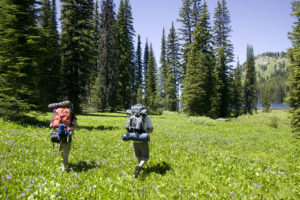The National Parks are our national treasures, from Grand Canyon and Yellowstone to Shenandoah and Everglades. Nature’s masterpieces are unique places, almost unimaginable unless you have seen them. Only one thing is wrong with our national parks – people sometimes want to visit.
 That is the view of a chorus of activists who see people as icky, their presence an affront to nature. Humans are destructive of the environment everywhere, so the theory goes, but especially on public lands. People might be tolerated if they had the decency to stay in their cities, and leave the great outdoors alone. Well, not completely alone, but left as a private playground for young elitists, who can hike hundreds of miles into the wilderness, and know which mushrooms to eat.
That is the view of a chorus of activists who see people as icky, their presence an affront to nature. Humans are destructive of the environment everywhere, so the theory goes, but especially on public lands. People might be tolerated if they had the decency to stay in their cities, and leave the great outdoors alone. Well, not completely alone, but left as a private playground for young elitists, who can hike hundreds of miles into the wilderness, and know which mushrooms to eat.
A New Republic headline this Spring made the bold prediction that “The Future Is the Car-Free National Park.” The popular and talented environmental writer Christopher Ketcham explains “how Washington’s short-sighted fealty to the automobile has ruined the great outdoors.” He and many others want to end National Park Service funding that enables public access. That is the history of these parks, of course, preserved for the enjoyment of generations of Americans, who developed an early love of vacationing in such places. The super-wealthy could travel the world in luxury liners, but ordinary people could pile into the family car for a picnic, or a weekend of camping and fishing. The designation of national parks and forests actually led to development of the RV industry, as campers flocked to public lands to escape the city briefly. They could enjoy America’s majestic beauty, and perhaps even more importantly, feel part of it.
That is the problem, according to Ketcham and others. He is an avid outdoorsman who enjoys taking his own family to national parks. He specifically recounts a trip to Zion, which was ruined for him by the fact that others were there to enjoy it, too. He still has the youth and stamina to go anyplace one can walk (comedian Stephen Wright famously joked that every place is walking distance if you have the time).
Millions of Americans do not have that luxury. Age and infirmity rule out hiking for many; lack of time and money make longer and slower trips impossible for others. People struggling to make ends meet cannot afford expensive gear from REI, and working people can’t often take a week to hike the wilderness. Ketcham won’t always be able to, either. Eventually the need for a Jeep will catch up to him, too, but for now he advocates a complete ban of all vehicles from all national parks.
He thinks the National Park Service should never have built roads in the first place, because that overemphasized visitorship as a goal. But Americans are less likely to support, with millions of tax dollars, places they are not allowed to visit. Obviously, there is intrinsic value in preserving special places like the Grand Canyon, whether we visit or not. Still, these places belong to all of us, and occasionally we want to the right to make that family trip, take home movies of the bears in Yellowstone, photograph the kids at Carlsbad Caverns, and treasure these once-in-a-lifetime memories.
The anti-automobile brigade wishes, instead, that “the motoring public will head elsewhere, hopefully stuck in the cities…” Ketcham describes the vision perfectly, the roads “torn up, replaced with dirt and horse paths. No more frantic crowds racing from vista to vista, imbecilic with checklists in the guidebooks. Visitors will plod along, travel the park on foot with backpack, or hire a horse and a wrangler guide… Campgrounds will be primitive. No more hook-up stations for your RV. No more flush toilets… You will be mostly on your own.” He suggests spending $100 million to destroy all the roads in Yellowstone, for starters. No need to address the enormous maintenance backlog in our parks – just stop maintaining them.
Advocates of this theory are genuine in their love of nature, and honest enough to admit that “few people except the very hardy will want to walk the long distances of our parks, especially in the West.” Fortunately, this view remains that of a small minority, not the vast majority of Americans who love their national parks.
Some say we are loving our national parks to death. But limiting access to the elite would lead many Americans to stop caring about places where they are unwelcome. In the long run, that would be a real death sentence for our national parks.
A version of this column originally appeared in the Grand Junction Daily Sentinel April 13, 2018.




Comments on this entry are closed.